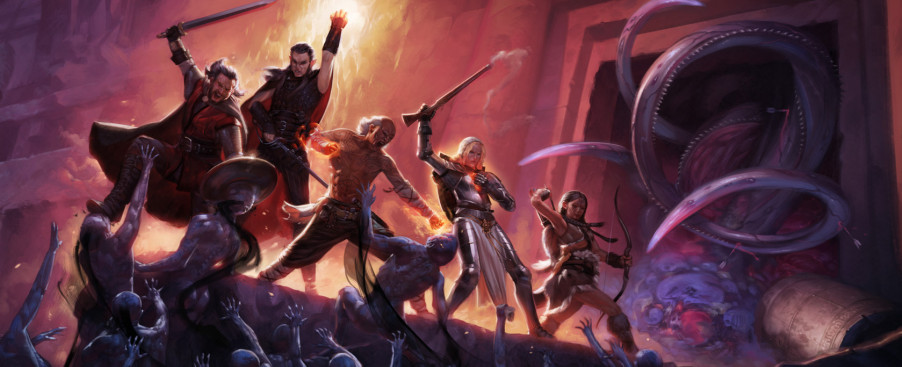Pillars of Eternity Writing Interview
-
Category: News ArchiveHits: 1791

The folks at RPGCodex have interviewed Pillars of Eternity's writer Carrie Patel who goes on to explain how she joined the industry, what are the differences between writing for a book and a videogame, how the collaborative process works at Obsidian and more. Here's a snippet:
What are some of your literary influences and your favorite games?
It's hard for me to pinpoint who I actually emulate, but I'll tell you who I'd love to follow. I love Neal Stephenson -- his books are funny, smart, and thrilling all at the same time, and I'm convinced that the first two pages of Snow Crash would hook anyone. I loved Umberto Eco's The Name of the Rose for the way it bound a fascinating mystery, two surprisingly lovable characters, and interesting theological questions. And I'd also have to mention Dune. I liked the story, and beyond that, I loved the way it fleshed out an entire universe of political and economic conflicts.
On the games front, my big formative experiences were with the old Sierra adventure game series -- King's Quest, Quest for Glory, the Colonel's Bequest. I loved playing through stories that were also puzzles, and it was always satisfying to explore, explore, and explore again and finally find the thing (an old boot, a soup bone) your character inexplicably needed. It was fun even though it was way too easy to play yourself into an unwinnable corner without realizing it.
I've also loved Morrowind -- it was the perfect blend of sandbox and story in a nontraditional world, and it just goes to show that you don't need to play a plumber to travel a world with giant mushrooms. I had tons of fun with both the combat and the storyline of the Mass Effect series, and I loved stealthing my way through Deus Ex: Human Revolution. For something a little different, Braid and The Stanley Parable did amazing things with experimental storytelling while unfolding their narratives with unique but fitting gameplay. The Stanley Parable is one of the funniest games I've ever played, and even though it's brief, I was as engrossed in it as I've ever been in bigger, more produced games. And the end of Braid is one of my favorite "aha" moments in any game. And, of course, Planescape Torment is a great example of a unique and immersive narrative -- even though character customization is limited, the choices presented to the player make the experience every bit as personal as if you'd built the character from scratch.'‹
...
What do you find the most difficult aspect of writing for a video game like Pillars of Eternity?
Accounting for all of the extremes of player agency is challenging. One of our goals is to create a story that people can play however they want, but that means that when you're writing and scripting, you have to consider all of the secondary ways someone could try to complete the game. What if the player kills this NPC? Would exploring this area too early break the story? You don't want players to feel shackled, but you don't want to create situations where they might end up with an unplayable mess. So you set up failsafes to guide them through the key moments so that they can ultimately play however they want and still enjoy the full game.'‹
You once wrote, (I guess the moral of the story is that perspective and first impressions are powerful) and ([good fiction] presents complex characters and makes them somehow sympathetic, even when they're not the kind of people you can pull for.) How do you approach making possible antagonists sympathetic when (especially in video games) they do not have the luxury of perspective?
By giving the antagonist believable motives that become personal for the player. Ideally, the antagonist has reasons for her shenanigans, and ideally, they connect to the big picture questions of the game. And if the player is facing these questions throughout the game -- in quests, NPC interactions, and companion relationships -- then by the end, he'll have seen many sides of them. Perhaps some that make the antagonist's position relatable if not actually sympathetic. And whether or not the player actually sides with the antagonist, he'll at least have an understanding of her position and how she reached it.
Of course, not every antagonist has to be sympathetic. They can be 31 flavors of vile, and sometimes that's better.'‹

